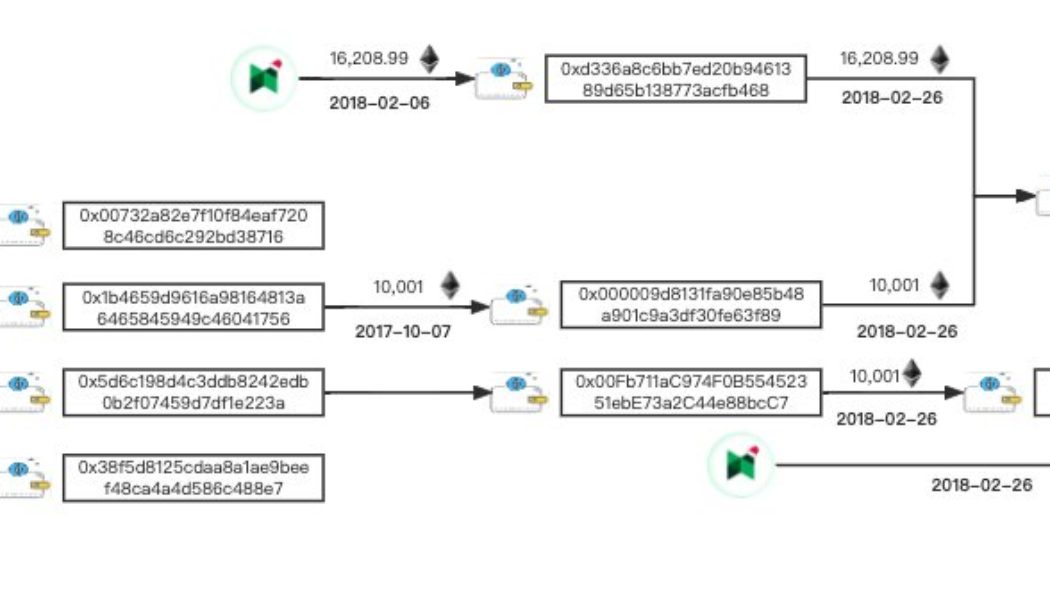Trading
Uniswap to allow users to buy cryptocurrency using debit and credit cards
Decentralized exchange Uniswap has partnered with fintech company Moonpay to allow users to buy cryptocurrency on its web app using debit cards, credit cards, and bank transfers. The bank transfer option is being rolled out for users within most U.S. states, Brazil, the United Kingdom and the Single Euro Payments Area, also known as SEPA. In the announcement made on Dec. 20, Uniswap shared that its users will now be able to convert fiat to cryptocurrency on the Ethereum mainnet, Polygon, Optimism, and Artibrum in a matter of minutes. 1/ Go direct to DeFi Starting today, you can now purchase crypto on the Uniswap Web App using a credit/debit card or bank transfer at the best rates in web3 thanks to our partnership with @moonpay! https://t.co/YVyk8e6d2h — Uniswap Labs (@Uniswap) Decemb...
Ethereum bulls wake up after four years to transfer 22,982 ETH
At a time of bear market-induced uncertainty, crypto investors often tend to stick with Bitcoin (BTC) and Ethereum (ETH) to evade impermanent losses. As a result, the significant movement of such assets intrigues the community as they try and decipher the intent behind the move. Two addresses that have remained dormant for over four years recently came back to life to transfer 22,982 ETH to new addresses — leaving investors scratching their heads. The ETH tokens in question originated from trading platforms Genesis and Poloniex and were found transferring 13,103.99 ETH and 9,878 ETH, respectively. #PeckShieldAlert 2 Dormant addresses transferred 22,982 $ETH (~27.2M) to 2 fresh addresses, their last movement was October 2018 (1,535 days ago). These $ETH originated from Genesis and Poloniex ...
Amber Group ditches expansion plans after denying insolvency: Report
Cryptocurrency trading firm Amber Group is putting its expansion plans on hold despite the FTX contagion having “no disruption” to its daily operations, according to a senior executive. Amber has scrapped plans to expand in Europe and the United States as a consequence of exposure to the now-defunct exchange FTX and will focus on institutional clients in Asia, according to managing partner Annabelle Huang. Huang also said that Amber has been forced to deprioritize its new metaverse project due the FTX contagion, the Financial Times reported on Dec. 9. Apart from ditching its expansion plans, the firm has reportedly been cutting its headcount recently. After reportedly laying off up to 40% of staff in September, the firm continued to lay off employees again in December. According to Huang, ...
Margin trading vs. Futures: What are the differences?
Margin trading aims to amplify gains and allows experienced investors to potentially get them quickly. They may bring dramatic losses, too, if the trader doesn’t know how they work. When trading on margin, crypto investors borrow money from a brokerage firm to trade. They first deposit cash into a margin account that will be used as collateral for the loan, a kind of security deposit. Then they start paying interest on the borrowed money, which can be paid at the end of the loan or with monthly or weekly installments, based on current market conditions. When the asset is sold, proceeds are used to repay the margin loan first. The loan is necessary to raise investors’ purchasing power and buy larger amounts of crypto assets, and the assets purchased a...
Bybit announces second round of layoffs in 2022 to survive bear market
Yes, the bear market weeds out the bad actor, but it also forces the existing players to rethink their business strategies to offset resultant losses. In this effort, crypto exchange Bybit announced mass layoffs for the second time in 2022. Ben Zhou, the co-founder and CEO of Bybit, announced a reorganization plan amid a prolonged bear market, which involves a steep reduction in the workforce. The “planned downsizing” will affects employees across the board: “We are all saddened by the fact this reorganization will impact many of our dear Bybuddies and some of our oldest friends.” Independent reporter Colin Wu highlighted that the layoff ratio is 30%. On June 20, Bybit silently laid off employees, citing unsustainable growth, which was confirmed via leaked internal documents. Bybit’s emplo...
Bybit launches $100M support fund for institutional traders
Crypto derivatives exchange Bybit has launched a new support fund to help institutional traders access liquidity in the wake of the FTX collapse — an event that triggered a fresh wave of panic selling across the digital asset space. The support fund, valued at $100 million, is available to market makers and high-frequency trading institutions struggling with financial or operational difficulties following the collapse of FTX earlier this month, Bybit disclosed on Nov. 24. The funds will be distributed to eligible applicants at a 0% interest rate. To be eligible, institutional traders must be active on Bybit or other exchanges. The maximum amount distributed per applicant is $10 million and the funds must be used for spot and Tether (USDT) perpetual trading on Bybit. Once the second-largest...
What are crypto whale trackers and how do they work?
There are dedicated solutions to track the actions of crypto whales. These solutions can provide analytics on whale actions and, in some instances, can also make investment/trading decisions for the user. Crypto traders and investors constantly track the amount of cryptocurrencies going in and out of exchanges. When a cryptocurrency like Bitcoin or Ether (ETH) is moved in large quantities into an exchange, it is expected to see some sell action resulting in a fall in price. Conversely, if cryptocurrencies flow out of exchanges into wallets, it is considered a precursor to a rise in price. This is because when exchanges have a high net outflow of cryptocurrencies, they have reduced supply resulting in an increase in price. Oftentimes, a whale could buy cryptocurrencies on an exchange and mo...
Fidelity offers retail investors commission-free BTC and ETH trading
Fidelity Investments is expanding retail access to commission-free cryptocurrency trading services — a move designed to recognize growing mainstream interest in digital assets. According to CNBC, Fidelity’s new crypto offering will be powered by its subsidiary, Fidelity Digital Assets. Dubbed Fidelity Crypto, the new service will give retail investors the ability to buy and sell Bitcoin (BTC) and Ether (ETH) with minimal fees. Instead of a commission, Fidelity Crypto will incorporate a 1% spread into every trade. In financial markets, a spread represents the difference between the buy and sell prices quoted for an asset. Although Fidelity didn’t specify a launch date for the new offering, it has opened up an early-access waitlist to users. The brokerage said it is targeting retail in...
Singapore bank DBS uses DeFi to trade FX and state securities
DBS Bank, a major financial services group in Asia, is applying decentralized finance (DeFi) for a project backed by Singapore’s central bank. DBS has started a trading test of foreign exchange (FX) and government securities using permissioned, or private, DeFi liquidity pools, the firm announced on Nov. 2. The development is part of Project Guardian, a collaborative cross-industry effort pioneered by the Monetary Authority of Singapore (MAS). Conducted on a public blockchain, the trade included the purchase and sale of tokenized Singapore government securities (SGS), the Singapore dollar (SGD), Japanese government bonds and the Japanese yen (JPY). The project has shown that trading on a private DeFi protocol enables simultaneous operations of instant trading, settlement, clearing and cust...
3Commas issues security alert as FTX deletes API keys following hack
Automated crypto trading bot provider 3Commas issued a security alert after identifying certain FTX API keys being used to perform unauthorized trades for DMG cryptocurrency trading pairs on the FTX exchange. 3Commas and FTX conducted a joint investigation in relation to reports from users of unauthorized trades on the DMG trading pairs on FTX. The duo identified that hackers used new 3Commas accounts to perform the DMG trades adding that “The API keys were not taken from 3Commas but from outside of the 3Commas platform.” A subsequent investigation found fradulent websites posing as 3Commas were being used to phish API keys as users linked their FTX accounts. The FTX API keys were then used to perform the unauthorized DMG trades. 3Commas further suspects that hackers used 3rd-party browser...
What directional liquidity pooling brings to DeFi
Modern decentralized exchanges (DEXs) mainly rely on liquidity providers (LP) to provide the tokens that are being traded. These liquidity providers are rewarded by receiving a portion of the trading fees generated on the DEX. Unfortunately, while liquidity providers earn an income via fees, they’re exposed to impermanent loss if the price of their deposited assets changes. Directional liquidity pooling is a new method that is different from the traditional system used by DEXs and aims to reduce the risk of impermanent loss for liquidity providers. What is directional liquidity pooling? Directional liquidity pooling is a system developed by Maverick automated market maker (AMM). The system lets liquidity providers control how their capital is used based on predicted price changes. In the t...





















